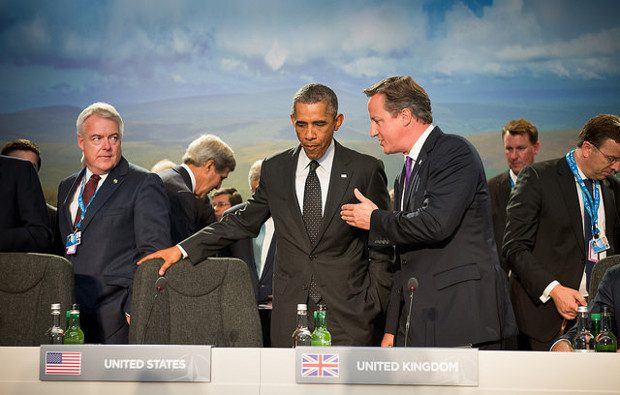Why Cameron Recalled Parliament and Obama Ignored Congress

Carol Giacomo praises Cameron for recalling Parliament to debate and vote on U.K. participation in the ISIS war:
One democratic leader has decided to ask his country’s legislature to vote before going to war. Pity that it isn’t President Obama.
Prime Minister David Cameron on Thursday recalled Parliament, which was in recess (just as Congress is). It will convene on Friday to consider whether Britain should cooperate with the United States in conducting air strikes against Islamic State targets in northern Iraq.
Mr. Cameron’s proposal to join the U.S.-led military operation has the backing of all three main political parties, so it is expected to win approval comfortably.
Cameron has done the right thing here, but it’s worth reflecting a little more on why Obama hasn’t. Last year’s Syria debate evidently taught Obama that he shouldn’t ask for Congressional approval for something that he already falsely believes he is permitted to do on his own. He waged illegal war in Libya for the better part of a year, and almost no one cared. He delayed a foolish intervention in Syria to ask for Congressional support, and he was chastised for “dithering,” and then in the face of overwhelming opposition he called off an attack that he should never have contemplated. As a result, he was the subject of boundless scorn and derision for undermining American “credibility.” Obama took a lesson from all this, and it was that Congress should simply be bypassed whenever possible. Unlike Cameron, Obama isn’t permitted by our laws to start a war on his own authority, but he is quite willing to do so on the assumption that no one can or will stop him. Unless there is a huge public outcry against it, Congress has shown that it will acquiesce to whatever Obama wants to do when it comes to using force.
If Obama had had his own way last year, Congress would not have been involved in debating whether to authorize military action in Syria. His plans for intervention took a detour only after the House of Commons rejected U.K. involvement in the attack, which unexpectedly removed Britain from taking part in the “limited” strikes against the regime and put Obama in the awkward position of going ahead with an attack that the legislature of one of America’s closest allies had just rejected. Even though Cameron and Obama suffered similar political humiliations last year over intervention in Syria, the two have reacted very differently since then. Cameron seems to have accepted that he shouldn’t commit the U.K. to a foreign war without explicit support from Parliament. By contrast, Obama concluded that his mistake was not in trying to intervene but rather in bothering to ask for support. Officially, Cameron is not obliged to seek authorization from Parliament for military action, but he did so last year and has done so again now because he feared the political danger of not doing so. Such is the awful nature of our political culture that the greater risk for Obama was to defer military action until after Congress had debated and approved it.
Comments